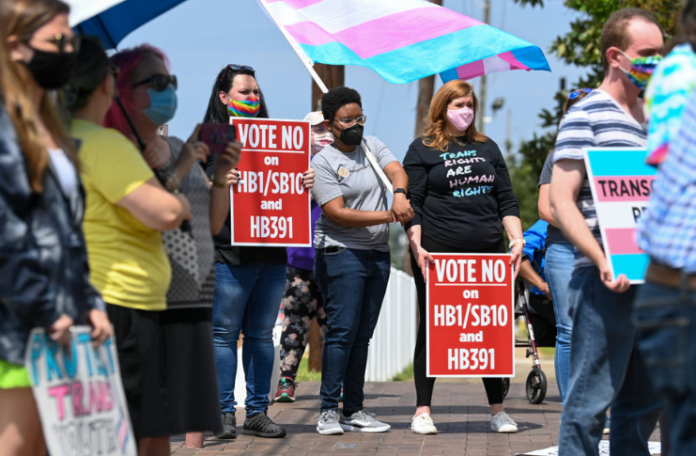
A state Senate bill that aims to prevent transgender athletes in Michigan high schools from competing on sports teams that align with their gender identity landed condemnation and support during a legislative hearing in Lansing Tuesday afternoon.
Senate Bill 218, which was introduced in March by state Sen. Lana Theis (R-Brighton) and is co-sponsored by 12 Republicans, would mandate that high schools ban transgender boys from cisgender boys’ sports teams and transgender girls from cisgender girls’ teams. The Education and Career Readiness Committee did not take action on the bill.
The Michigan bill is part of a flurry of anti-transgender legislation being pushed by conservatives nationwide this year; 34 state legislatures, most of them Republican-controlled, are considering banning transgender girls from sports teams. And five states — Idaho, Tennessee, Mississippi, Arkansas, and South Dakota — already have.
The Human Rights Campaign, a leading LGBTQ rights group, called 2021 “the worst year for anti-LGBTQ legislation in recent history.”
Theis, who chaired Tuesday’s hearing on the legislation, and other supporters said the bill would protect cisgender female athletes. Democratic lawmakers on the committee and opponents of the bill said it further targets and marginalizes transgender youth and will ultimately harm cisgender athletes, as well.
Republican introduces anti-trans sports bill, following trend in other states
“It’s a matter of fairness and ensuring there’s an equal playing field for every athlete,” Theis said after arguing that transgender women and girls have an unfair athletic advantage over cisgender women, a claim that some researchers have said is not rooted in science.
Dr. Maureen Connolly, a pediatrician from Detroit who works with transgender adolescents, urged lawmakers to vote against the legislation.
“What we know for certain is transgender youth face stigma and rejection, which lead to higher rates of depression, anxiety and suicide,” Connolly said at the hearing. “I see transgender youth as a clinician every single day I’m in clinic; playing sports is an excellent way for these young people to form supportive relationships, be part of a team, and engage in physical activity.”

Exclusion from high school sports, meanwhile, “will have a direct negative impact on the health and wellbeing of transgender young people and will only add to the marginalization that they may be experiencing at school,” Connolly said.
The doctor also emphasized that the concept of biological sex is not one in which there are two clear-cut categories — male and female, an idea that dominated much of the supporters’ arguments.
“I hear again and again this reliance on the idea of biological sex and, as a physician and an expert in the medical field, I can say that even that concept of biological sex has complexity within it,” Connolly said. “There are chromosomal differences — people who have XXY conditions, congenital adrenal hypoplasia that affects the amount of testosterone in someone’s body who was assigned female at birth. So this idea that we can easily and clearly, naturally put people in one of two categories when it comes to biological sex is actually not reflective of the science and doesn’t reflect the diversity that exists naturally in the world.”
Supporters of the bill heavily centered their arguments around athletic differences between cisgender women and cisgender men. Gabriel Higerd, a former adjunct professor of exercise science who researches transgender sports policy, said “biological females are one of our nation’s greatest treasures” and argued that this bill is necessary because it protects cisgender female athletes from competing against transgender female athletes. The statistics he cited were rooted in cisgender men outperforming cisgender women in sports.
“The best girl [athlete] in the state would not be remotely close to winning if there was not sex segregation,” Higerd said.
Families say athletic bans would exact a toll on rural transgender youth
Connolly, the pediatrician from Detroit, disagreed.
“The science is still evolving on what happens when a young person has their natal puberty suppressed, has gender affirming hormones before the effects of testosterone,” she said. “There are a lot of avenues through which a young person can affirm their gender identity and how a young person achieves and evolves that — for example, if they see a doctor and get access to medically necessary treatments — how does that impact their performance? That science is still evolving.”
During the hearing, state Sen. Dayna Polehanki (D-Livonia) called the bill “a solution in search of a problem” and emphasized the small percentage of transgender student athletes in the state. There are about 180,000 student athletes annually in Michigan, and 10 transgender youth have applied to play sports in Michigan over the past five years.
“I was a teacher before this and was co-advisor of our gay-straight alliance, and the transgender kids I knew wanted nothing to do with sports,” Polehanki said. “They just wanted to walk through the halls and be accepted.”
Polehanki also noted that the Michigan High School Athletic Association (MHSAA) does not support Senate Bill 218, and MHSAA spokesman Geoff Kimmerly told WHMI-FM that the legislation could end up preventing cisgender female athletes from participating in sports.
“During the 2018-19 school year — our last full year since we were not able to play sports last spring due to the COVID pandemic — we had more than 800 girls participate on boys teams,” Kimmerly said in an interview with WHMI. “They would not be allowed to do so under this legislation.”
Theis said the legislation would not result in cisgender girls being barred from playing on cisgender boys’ teams, provided there is no specific cisgender girls’ team for that sport, such as football.

Evie Edwards, a professional cyclist from North Carolina, said it’s “not fair play” for transgender women to compete against cisgender women and argued that transgender women could ultimately entirely replace cisgender women in sports.
“We talk about how women are to be inclusive of males, but we’re not talking about women and their right to compete against only biological girls,” Edwards said.
Mary Higgins, a former national champion cyclist, testified that having transgender women compete against cisgender women “will completely destroy women’s sports.”
“The effects are so devastating,” Higgins said. “…I know women who refuse to race now.”
Currently, there’s no service that tracks the number of transgender athletes in the United States, but academics have said the number is small. The New York Times reported that Joanna Harper, a researcher based at the Loughborough University in Britain, said that of 200,000 women in college sports, about 50 are transgender. The Associated Press recently reported that lawmakers supporting banning transgender athletes from sports could not “cite a single instance in their own state or region where such participation has caused problems.”

Jeanne Hess, a Kalamazoo City Commissioner who has coached women’s sports for 40 years, said it’s crucial to stop pitting transgender women against cisgender women and focus on prioritizing inclusion and support for all students.
“We are speaking about the whole athlete here, not only her physical but her mental, emotional and her very sense of what some may call her very spiritual self,” Hess said. “…The [National Collegiate Athletic Association] has said they will remove lucrative championship events from states with discriminatory laws. And Senate Bill 218 is discriminatory.”
State Sen. Erika Geiss (D-Taylor) called the legislation “a violation of the 14th Amendment,” which prohibits discrimination on the basis of sex.
“This is not protecting anybody,” Geiss said.
The hearing concluded with testimony from Idaho state Rep. Barbara Ehardt, a Republican who was the lead sponsor of the 2020 “Fairness in Women’s Sports Act,” the country’s first ban on transgender athletes.
Legislation to expand LGBTQ rights gets GOP support in House, Senate
“When we get to the point where we’re willing to say it’s OK for one biological male to take the spot of a female, at what point do we stop?” Ehardt said. “It won’t be that long in the future where you’ll have 12 biological males try out for that girls’ team, and when all 12 of those biological boys make that team, my question is where do all the girls go?”
Ehardt said that, as a child, she was told she couldn’t pursue her dream of being a female athlete, noting those conversations happened prior to Title IX, federal legislation that passed in 1972 and gave women athletes the right to equal opportunity in sports.
“I was literally told, ‘that’s not what girls do,’” she said.
In light of that story, Geiss asked why Ehardt would want transgender youth to go through the same thing she had as a child.
“You’re willing to allow trans kids to hear that same message,” Geiss said.







